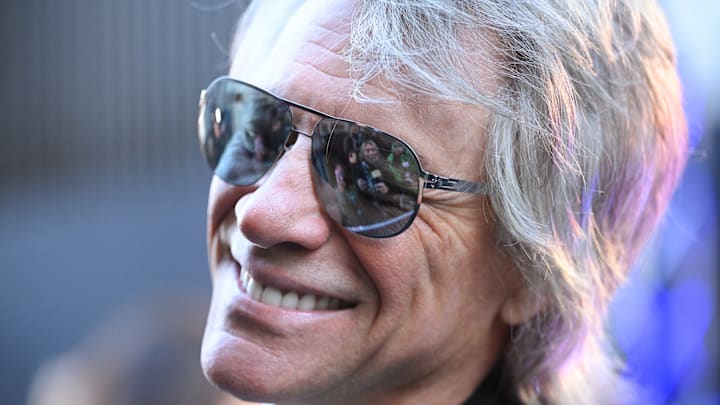This will be a bit of an unusual thing to discuss, but I think it's an example of views changing over time. To begin with, I am not a huge fan of Bon Jovi's music. In fact, when I first heard bands like that in the 1980s, it did nothing to boost my interest in popular music (that mostly changed with The Offspring and Nirvana). Still, over time, I have come to respect him, at least considerably more than I did.
Why? In some key ways, he just seems like a nice guy. So, when I read that he initially had mixed feelings about one of his greatest hits, I look at it differently today than I would have, say, 20 years ago. I see it more as an underdog tale, rather than a further reason to trash the song, or the artist.
Granted, I still have my opinions (I think Bon Jovi's "Runaway" is superior to "Livin' on a Prayer" — if I had to choose the best Bon Jovi song, that I have heard). However, I want to talk about "Livin' on a Prayer" a little bit. If you're like me, you still don't care much for "Livin' on a Prayer." Well, as it turns out, you needn't feel guilty for being a meanie to Mr. Bon Jovi. Interestingly, Jon Bon Jovi himself wasn't initially fond of the song...at least at first.
Bob Jovi's mixed feelings on one of his hits
Sure, "Livin' on a Prayer" became a massive international success, achieving multi-platinum status and topping the American charts for a month in 1987. However, as Jon Bon Jovi revealed to People magazine (as quoted here by Loudwire): "It wasn't that I didn't want to record it, but I wasn't all that impressed on the day that we wrote it...It was the simple chord progression, the melodies, and the lyrics."
Fortunately, for him (and the band's fans), the song gained new life thanks to an uncredited contribution from bassist Hugh McDonald. "The bass line came to life in the demo studio, when we took it back to the band and worked it up," Bon Jovi said. "That's how it became what it is."
Reflecting on the song's journey, Bon Jovi acknowledged the band's vision despite his initial reservations. They knew what they had want but..."We just didn't have it, and so I was like, 'Yeah, it's good. Good day. Good day at the office,' and I was wrong." He added, "It's one of the biggest songs in our catalog."
For me, it's an example of how just a few things can change one's perspective, which is similar to my initial feelings about Bon Jovi himself. And on that note, I want to mention a few reasons why I actually respect him, even if I don't blast his music...
The Jon Bon Jovi Soul Foundation
A big reason I speak well of Bon Jovi is that, in the early 2000s, he started The Jon Bon Jovi Soul Foundation: "The Jon Bon Jovi Soul Foundation has helped provide support for almost 1,000 units of affordable and supportive housing in 12 states for thousands of people including youth and veterans. The Soul Foundation’s expanded mission helps those in need of a warm, nutritious meal and now operates three JBJ Soul Kitchens in New Jersey."
When it comes to the Soul Kitchen program:
"JBJ Soul Kitchen seeks to provide healthy, locally-sourced food in a warm and welcoming restaurant setting to an in-need and paying customer to address the issues of food insecurity. We empower individuals by providing resources and volunteer opportunities. We encourage our paying customers to effect change by ‘paying it forward’ to cover the cost of the in-need customers. We promise to treat all of our customers with dignity and respect while uniting communities and forming healthy and lasting relationships through food."
How he learned to be nice?
In a separate People interview, Bon Jovi noted that during his pre-fame experience as an errand boy for the Power Station recording studio in N.Y.C: "The biggest thing I learned there was the bigger the star, the nicer the person...It was the Rolling Stones who would hold the door open for you when you were coming in with the burgers and the coffee." He even says they asked him how his demo was going.
Now, he probably would have been nice even without The Rolling Stones, but it just shows that it's part of his character.
JBJ's self-deprecating sense of humor
A funny moment from the FX sitcom It's Always Sunny in Philadelphia features Danny De Vito's character, Frank Reynolds, referring to Jon Bon Jovi as "Bovine Joni." Now, I don't know if JBJ has ever watched this scene, but I have reason to think he wouldn't be offended if he did. Why? Jon Bon Jovi actually has a solid sense of humor.
Many years ago, Triumph the Insult Comic Dog, a breakaway star character from NBC's Late Night with Conan O'Brien, was invited on stage to joke about (or "poop on") Jon Bon Jovi. To this day, it's still one of Triumph's...well, triumphs. If you're not easily offended by an insult comic dog puppet, check it out! One of the YouTube comments says it all: "I was never a Bon Jovi fan, but I like how they can laugh at themselves."
If you give him a chance, JBJ will probably win you over. It reminds me of how Rick Astley, another pop star, seemingly embraced the phenomenon of "Rickrolling." I don't know if it's just him being a good sport, or because it helped his hit song "Never Gonna Give You Up" reach over 1.5 billion views on YouTube(!). Either way, a good sense of humor is a sign of character strength, and a way to achieve success. (Of course, if JBJ ever gets MeToo'd, know that I never cared for him, always suspected something was wrong with him, and the kind words in this article are only intended sarcastically.)
